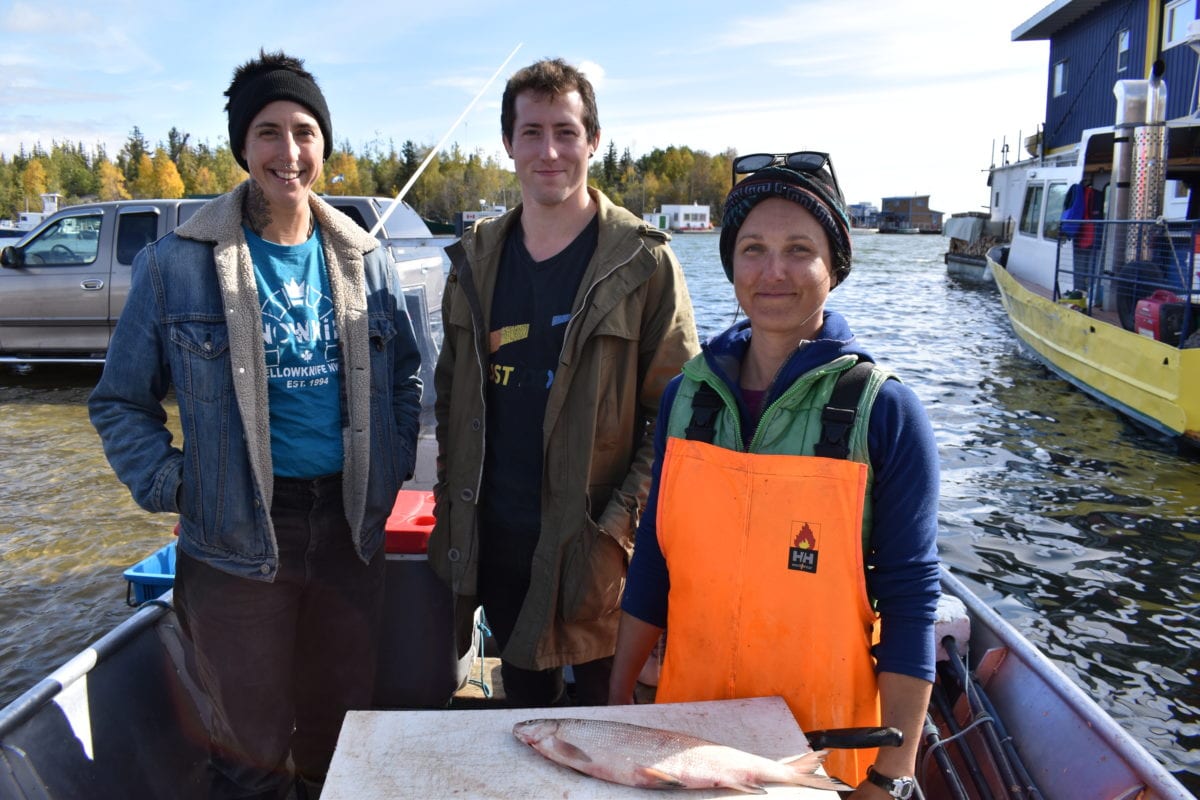“Only the flexible survive” might someday be an aphorism coined to describe how small businesses can cope with a pandemic.
In the case of Fish on the Bay, its small size and mobility helped it adapt as its regular business channels dried up over the last six months.
When the pandemic arrived in the NWT in March, it snapped two of the company’s three business lines.

Its food truck, where staff prepare fresh meals of fish and chips, was set up by the Snow Castle for just a few weeks until that attraction closed on March 17.
“We did lose the season at the castle,” said Fish on the Bay’s general manager Jared Bihun. “We struggled there more than anything else.”
They closed their downtown kitchen space for two months due to the end of almost all events where they would normally provide catered meals.
Bihun estimates the combined loss of food truck sales and catering – the business’s cash cow – gouged out 75 per cent of sales.
At that time, only its third line remained: online fish sales and direct transactions from the Government Dock, said fisher Stephanie Vaillancourt.
However, revenues from those sales were lower than normal. Volume dealt to Northern Fancy Meats and Northbest Distributors increased, but sales to tourism or restaurant industry clients like Blachford Lodge dropped. Private clients remained steady.
And, as with other agile businesses in Yellowknife during Covid, the slowest months of March and April pushed Fish on the Bay to accelerate its online activity.
“The fish and chips were the main income with the Snow Castle,” said Vaillancourt. “When that shut down we had to do more deliveries and Facebook and website (sales) to sort of compensate for that. Which is where we wanted to go in the long term but it just gave us a bit of a kick.”
Some renewal came in May, when the trio of Bihun, Vaillancourt and chef Niki Mckenzie revved up their fish and chip truck and set up in the Canadian Tire parking lot.
It was a strong month for them, not only because locals love fish but also because more home-bound Yellowknifers took up gardening and shopped at Canadian Tire for their green-thumb needs.
“There was a lot of foot traffic. We were doing really, really well,” Bihun said.
They shifted their format again in July, when on Canada Day they set up their outdoor pop-up shop on 51 Street. Diners could sit on picnic benches in a vacant lot as their meals were prepared in Fish on the Bay’s nearby truck.
Bihun was happy with the results of the pop-up shop and it did even better than he expected.
“People were coming from uptown with no reason to go downtown, just to grab stuff (from us), which is awesome,” he said. “It probably would have done significantly better if it hadn’t been for Covid because downtown would have been full every day.”

They closed their pop-up shop season with a special five-course dinner last weekend for 26 people who had to reserve spots in advance.
“It was just a way to emphasize that we are here. We’re still cooking, we still want to do these things, and also presenting ways that our fish products could be created,” Bihun said.
Now that the pop-up season is over, catering lies frustratingly out of reach for the trio.
Bihun said they only catered a few events over the summer, down from about six catering gigs per week during a good season.
Some high-profile catering clients would have been lucrative, like Folk on the Rocks, for whom Fish on the Bay had a verbal agreement to cater this summer, before it was cancelled.
“It was a good chunk of change, like over $15,000. We would be feeding 300 people every day. But we got hit hard on that,” said Bihun. “We (also) would have been a part of the Ramble & Ride, where we did revenue of about $5,000 or $6,000 on the food truck alone last year. This year we would have had our products there and potentially done a couple extra things as well. We got hit hard there (too).
“And then just regular caterings died off for about four or five months. We had one or two over the summer but we were just super careful. We had to man them so our manpower was a lot more than it needed to be for basic catering – just so guests aren’t touching (the food) because no communal food (is allowed). You have to actually give it to them. A lot of time we’ll have someone there. But in this case, we would have to have two people at it that could have easily been handled by one.”
Communal food and drinks are prohibited in all phases of the Emerging Wisely plan and the restriction on indoor gatherings of more than 25 people limits the potential of many caterers.
As the NWT approaches its first winter in the pandemic, Bihun is worried about the potential lost opportunities with catering during the holiday season, which he calls “the bread and butter of the catering world.”
“You potentially can make your profits for almost a whole year. Those holiday months really matter. But we’re also walking into flu season again, so restrictions coming back is the big worry.”
Still, Bihun and his team have the drive to work despite the difficult circumstances facing their industry.
“Within the restrictions we can do certain things, like smaller house parties, or events like that, where it’s a manned buffet or a plated dinner where people aren’t communal fooding. We’re pretty strict on that one,” he said.

